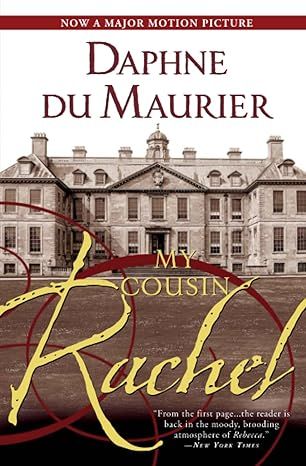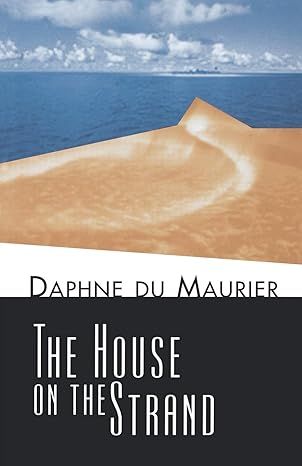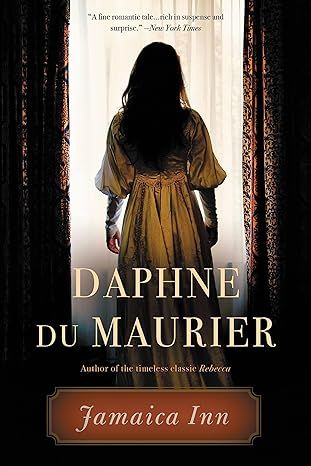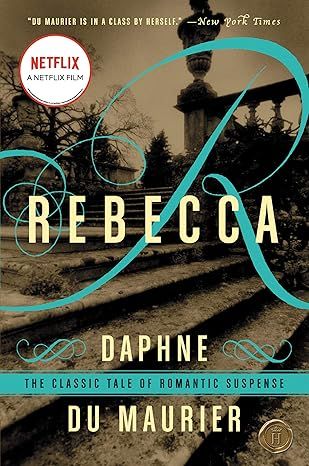My Cousin Rachel
4.2
-
5,821 ratings
NOW A MAJOR MOTION PICTURE STARRING RACHEL WEISZ AND SAM CLAFLIN!
"From the first page...the reader is back in the moody, brooding atmosphere of Rebecca."―The New York Times
From Daphne du Maurier, the legendary author of Rebecca and Jamaica Inn, comes a gothic classic set in beautiful, mysterious, and eerie Cornwall.
Philip Ashley's older cousin Ambrose, who raised the orphaned Philip as his own son, has died in Rome. Philip, the heir to Ambrose's beautiful English estate, is crushed that the man he loved died far from home. He is also suspicious. While in Italy, Ambrose fell in love with Rachel, a beautiful English and Italian woman. But the final, brief letters Ambrose wrote hint that his love had turned to paranoia and fear.
Now Rachel has arrived at Philip's newly inherited estate. Could this exquisite woman, who seems to genuinely share Philip's grief at Ambrose's death, really be as cruel as Philip imagined? Or is she the kind, passionate woman with whom Ambrose fell in love? Philip struggles to understand Rachel's intentions, knowing Ambrose's estate, his future, and his sanity, hang in the balance.
An atmospheric mystery full of doubt and paranoia, My Cousin Rachel is a suspenseful gothic treat for long-time fans and new readers of Daphne du Maurier.
Praise for Daphne du Maurier:
"Miss du Maurier is... a storyteller whose sole aim is to bewitch and beguile. And in My Cousin Rachel she does both, with Rebecca looking fondly over her shoulder."―New York Times
"Double-distilled readers' delight."―Manchester Guardian
Kindle
$9.99
Available instantly
Audiobook
$0.00
with membership trial
Hardcover
$28.40
Paperback
$10.49
Ships from
Amazon.com
Payment
Secure transaction
ISBN-10
1402217099
ISBN-13
978-1402217098
Print length
400 pages
Language
English
Publisher
Sourcebooks Landmark
Publication date
February 28, 2009
Dimensions
5.25 x 1 x 8 inches
Item weight
15.2 ounces
Product details
ASIN :
B00GR5MZFU
File size :
2072 KB
Text-to-speech :
Enabled
Screen reader :
Supported
Enhanced typesetting :
Enabled
X-Ray :
Enabled
Word wise :
Enabled
Editorial Reviews
"The gothic atmosphere combined with the mystery of who Rachel really is, kept this reader enthralled and turning the pages quickly. " ― Passages to the Past
"This is a great read that you won’t want to miss if you enjoy gothic mysteries!" ― S. Krishna’s Books
"A taut, well, written story that will no doubt grab you attention and not let it go until the very last page. " ― A Lovely Shore Breeze
" I think it's safe to say that I was haunted by this Gothic Tale long after I finished the book. Grade A." ― Musings of a Bibliophile
"Filled with gothic suspense this novel will no doubt have you wondering too as to what are Rachel’s real motivations and what will happen to the main characters. I throughly enjoyed this book and the characters." ― The Book Girl’s Nightstand
"My Cousin Rachel is a captivating Gothic story that pulses with emotion and dark undercurrents; you don’t want to miss it!" ― Book Review by Bobbie
"IF YOU HAVE NOT HEARD, read this thing." ― Books I Done Read
"Do you have books that as soon as you finished reading them, you were sorry the story ended?... My Cousin Rachel by Daphne du Maurier was such a book for me." ― Reading Extravaganza
"[I]t is hard to put this story down." ― Bookloons.com
"[D]efinitely entertaining and suspenseful." ― We Be Reading
"A classic manor mystery in the tradition of the Brontë sisters with a modern psychological twist, My Cousin Rachel is a fine introduction to the sort of refined madness that defines Daphne du Maurier's work. " ― Hipster Book Club
"In 1951, du Maurier released My Cousin Rachel and this one is, thus far in our du Maurier reading journey, A Reader's Respite's favorite... another Sourcebook's reprint and boy, are we thankful." ― A Reader’s Respite
"The excellent world-building and use of symbolism created a brooding, mysterious atmosphere." ― Genre Reviews
"I enjoyed reading My Cousin Rachel. It was intriguing and suspenseful." ― Cindy’s Love of Books
"I absolutely loved and enjoyed this novel from start to finish... She is just that good." ― The Literate Housewife
Read more
Sample
Chapter One
They used to hang men at Four Turnings in the old days.
Not any more, though. Now, when a murderer pays the penalty for his crime, he does so up at Bodmin, after fair trial at the Assizes. That is, if the law convicts him, before his own conscience kills him. It is better so. Like a surgical operation. And the body has decent burial, though a nameless grave. When I was a child it was otherwise. I can remember as a little lad seeing a fellow hang in chains where the four roads meet. His face and body were blackened with tar for preservation. He hung there for five weeks before they cut him down, and it was the fourth week that I saw him.
He swung between earth and sky upon his gibbet, or, as my cousin Ambrose told me, betwixt heaven and hell. Heaven he would never achieve, and the hell that he had known was lost to him. Ambrose prodded at the body with his stick. I can see it now, moving with the wind like a weather-vane on a rusty pivot, a poor scarecrow of what had been a man. The rain had rotted his breeches, if not his body, and strips of worsted drooped from his swollen limbs like pulpy paper.
It was winter, and some passing joker had placed a sprig of holly in the torn vest for celebration. Somehow, at seven years old, that seemed to me the final outrage, but I said nothing. Ambrose must have taken me there for a purpose, perhaps to test my nerve, to see if I would run away, or laugh, or cry. As my guardian, father, brother, counsellor, as in fact my whole world, he was forever testing me. We walked around the gibbet, I remember, with Ambrose prodding and poking with his stick; and then he paused and lit his pipe, and laid his hand upon my shoulder.
'There you are, Philip,' he said, 'it's what we all come to in the end. Some upon a battlefield, some in bed, others according to their destiny. There's no escape. You can't learn the lesson too young. But this is how a felon dies. A warning to you and me to lead the sober life.' We stood there side by side, watching the body swing, as though we were on a jaunt to Bodmin fair, and the corpse was old Sally to be hit for coconuts. 'See what a moment of passion can bring upon a fellow,' said Ambrose. 'Here is Tom Jenkyn, honest and dull, except when he drank too much. It's true his wife was a scold, but that was no excuse to kill her. If we killed women for their tongues all men would be murderers.'
I wished he had not named the man. Up to that moment the body had been a dead thing, without identity. It would come into my dreams, lifeless and horrible, I knew that very well from the first instant I had set my eyes upon the gibbet. Now it would have connection with reality, and with the man with watery eyes who sold lobsters on the town quay. He used to stand by the steps in the summer months, his basket beside him, and he would set his live lobsters to crawl along the quay in a fantastic race, to make the children laugh. It was not so long ago that I had seen him.
'Well,' said Ambrose, watching my face, 'what do you make of him?'
I shrugged my shoulders, and kicked the base of the gibbet with my foot. Ambrose must never know I cared, that I felt sick at heart, and terrified. He would despise me. Ambrose at twenty-seven was god of all creation, certainly god of my own narrow world, and the whole object of my life was to resemble him.
'Tom had a brighter face when I saw him last,' I answered. 'Now he isn't fresh enough to become bait for his own lobsters.'
Ambrose laughed, and pulled my ears. 'That's my boy,' he said. 'Spoken like a true philosopher.' And then he added, with a sudden flash of perception, 'If you feel squeamish, go and be sick behind the hedge there, and remember I have not seen you.'
He turned his back upon the gibbet and the four roads, and went striding away down the new avenue he was planting at the time, which cut through the woods and was to serve as a second carriage-way to the house. I was glad to see him go because I did not reach the hedge in time. I felt better afterwards, though my teeth chattered and I was very cold. Tom Jenkyn lost identity again, and became a lifeless thing, like an old sack. He was even a target for the stone I threw. Greatly daring, I watched to see the body move. But nothing happened. The stone hit the sodden clothing with a plonk, then shied away. Ashamed of my action I sped off down the new avenue in search of Ambrose.
Well, that was all of eighteen years ago, and to the best of my recollection I have not thought much of it since. Until these last few days. It is strange how in moments of great crisis the mind whips back to childhood. Somehow I keep thinking of poor Tom, and how he hung there in his chains. I never heard his story, and few people would remember it now. He killed his wife, so Ambrose said. And that was all. She was a scold, but that was no excuse for murder. Possibly, being over-fond of drink, he killed her in his cups. But how? And with what weapon? With a knife, or with his bare hands? Perhaps Tom staggered forth from the inn upon the quay, that winter's night, all lit with love and fever. And the tide was high, splashing upon the steps, and the moon was also full, shining on the water. Who knows what dreams of conquest filled his unquiet mind, what sudden burst of fantasy?
He may have groped his way home to his cottage behind the church, a pale rheumy-eyed fellow stinking of lobster, and his wife lashed out at him for bringing his damp feet inside the door, which broke his dream, and so he killed her. That well might be his story. If there is survival after death, as we are taught to believe, I shall seek out poor Tom and question him. We will dream in purgatory together. But he was a middle-aged man of some sixty years or more, and I am five-and-twenty. Our dreams would not be the same. So go back into your shadows, Tom, and leave me some measure of peace. That gibbet has long since gone, and you with it. I threw a stone at you in ignorance. Forgive me.
The point is, life has to be endured, and lived. But how to live it is the problem. The work of day by day presents no difficulties. I shall become a Justice of the Peace, as Ambrose was, and also be returned, one day, to Parliament. I shall continue to be honoured and respected, like all my family before me. Farm the land well, look after the people. No one will ever guess the burden of blame I carry on my shoulders; nor will they know that every day, haunted still by doubt, I ask myself a question which I cannot answer. Was Rachel innocent or guilty? Maybe I shall learn that too, in purgatory.
How soft and gentle her name sounds when I whisper it. It lingers on the tongue, insidious and slow, almost like poison, which is apt indeed. It passes from the tongue to the parched lips, and from the lips back to the heart. And the heart controls the body, and the mind also. Shall I be free of it one day? In forty, in fifty years? Or will some lingering trace of matter in the brain stay pallid and diseased? Some minuscule cell in the blood stream fail to race with its fellows to the fountain heart? Perhaps, when all is said and done, I shall have no wish to be free. As yet, I cannot tell.
I still have the house to cherish, which Ambrose would have me do. I can reface the walls where the damp enters, and keep all sound and well and in repair. Continue to plant trees and shrubs, cover the bare hills where the wind comes roaring from the east. Leave some legacy of beauty when I go, if nothing else. But a lonely man is an unnatural man, and soon comes to perplexity. From perplexity to fantasy. From fantasy to madness. And so I swing back again to Tom Jenkyn, hanging in his chains. Perhaps he suffered too.
Read more
About the authors
Daphne Du Maurier
Daphne du Maurier was born in 1906 and educated at home and in Paris. She began writing in 1928, and many of her bestselling novels were set in Cornwall, where she lived for most of her life. She was made a DBE in 1969 and died in 1989.
Reviews
Customer reviews
4.2 out of 5
5,821 global ratings
Kindle Customer Dar K
5
Crafted with poetic skill, you are forever left wondering ….
Reviewed in the United States on December 1, 2023
Verified Purchase
What a magnificent writer, so skillfully written that you felt you were in every page soaking up the details & becoming part of the story. Was he going crazy with lust? The hero must have questioned himself many times, he must have known the truth but refused to give in to it. I read this book in one day, hours, because I needed to know. Now I want more!
Read more
Paul McGrath
5
Another du Maurier Gem
Reviewed in the United States on February 28, 2014
Verified Purchase
It's nice to know that there are authors like Daphne du Maurier out there who can always be counted upon to provide an enjoyable reading experience. If one has struggled through a couple of sub-par contemporary novels, one knows with du Maurier he can sink his teeth into something excellent, and My Cousin Rachel delivers big time.
It is the story of a young man, Philip, 25, who has been brought up by his older, male, bachelor cousin, Ambrose. They are well-to-do and live on an estate in the Cornwall, England so beloved by Ms. du Maurier, and have a varied and busy life. Neither seems too particularly interested in women. As he gets older, Ambrose decides for health reasons that he must begin to winter in Italy, leaving Philip behind to take care of things.
Ambrose, of course, writes to Philip, and eventually tells him he has met a woman--their cousin Rachel--with whom he has fallen in love with and whom he has married. As time goes by, however, the letters become less enthusiastic. She is spending too much. He is becoming ill. He no longer trusts her or the Italian friend who seems to be hanging around her all of the time. Philip decides that he must go to Italy, but by the time he gets there, his beloved cousin is dead and buried and Rachel is nowhere to be found. Philip returns to England, disconsolate, heartbroken and angry.
Shortly thereafter he learns that Rachel is coming to pay a visit. And this is where the meat of the novel begins: although determined to get to the truth of the matter out of her, Philip instead becomes smitten.
The reason the novel works so well--indeed, the reason all of du Maurier's novels work so well--is that the characters are perfectly etched. Philip is not unintelligent and he is not uneducated. But he is 25, and he has traveled practically nowhere. The story is written in the first person by him, and although he is clearly self-confident, the reader sees how easily he is manipulated by the beautiful Rachel. She has him, as a major character points out, wrapped around her finger.
Rachel, of course, is etched through the eyes of Philip, and she is also a distinct, memorable character. Always dressed appropriately, always made up perfectly, she knows precisely how she must act with the various persons in the community in which Philip lives. They are enchanted by her, as is Philip, to whom she is alternately bewitching and standoffish.
The suspense begins when Philip learns little things about Rachel’s actions that don’t seem to fit with her overall charm. She is spending too much. He discovers additional letters from Ambrose that never made it to him previously. He is beginning to feel ill. Philip does not want to believe the implications of these things and does his best to ignore them. And then the Italian friend comes to visit.
Best not say more, except that the tension continues to build until the conclusion; a conclusion which, again typically of du Maurier, is unexpected. First-rate, page-turning fiction all the way.
Read more
17 people found this helpful
Tom S.
5
Rachel, My Torment
Reviewed in the United States on July 28, 2006
Verified Purchase
"They used to hang men at Four Turnings in the old days. Not any more, though...."
I'm a mystery writer, and Daphne du Maurier was one of my earliest inspirations. REBECCA is her masterpiece, followed by two other novels, THE SCAPEGOAT and this 1951 bestseller. The opening sentences of MY COUSIN RACHEL (above) are second only to the immortal opening line of REBECCA.
In 1840s Cornwall, young Philip Ashley inherits the fortune of the cousin who raised him, who has recently married abroad (Italy) and died under mysterious circumstances. Philip's pleasant life is disrupted by the sudden arrival of his cousin's beautiful widow, Rachel. Initially planning to send her on her way with a generous pension, he soon finds himself falling in love with her--even as he begins to suspect that she murdered his cousin and may be planning the same fate for him.
Rarely have I read a novel in which the tension and suspense arise almost exclusively from character. Who is this woman? What is she doing? How is the young hero going to respond to her? These questions have haunted readers since the book first appeared, and they will continue to do so for a long time to come. Reading the book again after all these years, I was amazed by du Maurier's plotting, her use of language, and the way she can create an atmosphere of foreboding that is almost palpable. Writers can learn a lot from this master, and RACHEL is a must for anyone who loves the very best in suspense.
PS: The 1952 film version, with Olivia de Havilland and an incredibly young Richard Burton in the leads, is also excellent.
Read more
188 people found this helpful
Janna Wong Healy
5
A PHENOMENAL GOTHIC TALE...MY FAVORITE DU MAURIER BOOK!
Reviewed in the United States on October 19, 2015
Verified Purchase
In my 20+ years as a story analyst for Hollywood film studios and production companies, I've read my share of stories and we are always looking for that "sense of foreboding," no matter the genre. This is easy to achieve for a scene or two but difficult to sustain. My Cousin Rachel not only opens with a sense of foreboding but Daphne du Maurier has the skill to continue it all the way to the very last word.
I have been a longtime fan of du Maurier's Rebecca; in fact, it's in my Top 10 all-time favorite novels. But, I found My Cousin Rachel to be just a tad more accessible than Rebecca and equally as compelling.
This is the story of Ambrose Ashley and his ward, his young cousin Philip, who are torn apart by the appearance into their lives of a distant cousin named Rachel. When Ambrose, who is not in good health and must spend winters in warmer climates, moves to Italy for the winter and marries Rachel suddenly, Philip is not pleased. In fact, he's jealous and thinks the worst of Ambrose's new bride. But when Ambrose ends up dying while abroad, all kinds of evil thoughts float through Philip's mind, prompted by letters to him from Ambrose. The most important thought is: did Rachel poison Ambrose?
And then Rachel comes to England and meets Philip. At first suspicious, Philip soon finds his cousin Rachel to be sweet and kind and considerate...or, is she?
This gothic-romance is stirring and engaging and a wonderful literary experience. I highly recommend it.
Read more
10 people found this helpful
green
5
i ended up as seduced as poor philip
Reviewed in the United States on January 17, 2015
Verified Purchase
this is a very interior book. it's not just the first person pov. it's about a lonely young man, who, having had an incredibly isolated childhood under the benign and loving influence of his guardian, ambrose, confronts a crisis in his life, and does all the rash, impetuous things that his interior world dictates.
i found this to have a very slow start, and was about to give it up, when the momentum of events in the plot increased with the death of philip's guardian, ambrose. it's here, within the description of young phillip's journey to italy, that the questions about how his beloved father figure died begin to unspool, and the outward thrust of the narration begins to delve inward with assumptions about the motivations of the characters involved. du Maurier's ability to to nestle mystery inside mystery is flawless, until the whole plot resembles a russian nesting doll,
the ambiguity builds in this novel until it's just about unbearable. is rachel truly a fortune hunting murderess? is philip's illness a by-product of her plotting? was ambrose's paranoia about her and her advisor, rainaldi, justified? du Maurier never lets up, even in the last scenes. this is the product of a mature, brilliant writing mind, as du Maurier has scaled the pinnacle of gothic suspense tales. in my cousin rachel, she shows us how it's done; she's the master of the genre.
Read more
4 people found this helpful
Best Sellers

The Tuscan Child
4.2
-
100,022
$8.39

The Thursday Murder Club: A Novel (A Thursday Murder Club Mystery)
4.3
-
155,575
$6.33

Sapiens: A Brief History of Humankind
4.6
-
140,302
$13.49

The Butterfly Garden (The Collector, 1)
4.3
-
88,556
$9.59

Things We Hide from the Light (Knockemout Series, 2)
4.4
-
94,890
$11.66

The Last Thing He Told Me: A Novel
4.3
-
154,085
$2.99

The Perfect Marriage: A Completely Gripping Psychological Suspense
4.3
-
143,196
$9.47

The Coworker
4.1
-
80,003
$13.48

First Lie Wins: A Novel (Random House Large Print)
4.3
-
54,062
$14.99

Mile High (Windy City Series Book 1)
4.4
-
59,745
$16.19

Layla
4.2
-
107,613
$8.99

The Locked Door
4.4
-
94,673
$8.53




